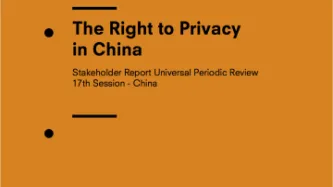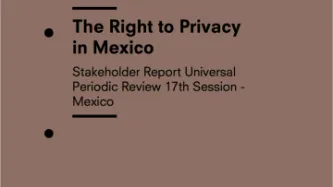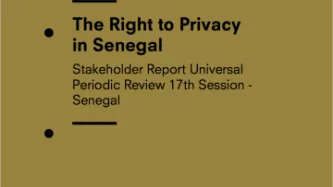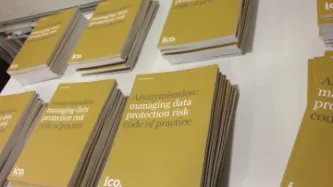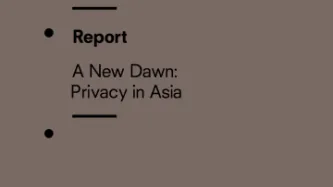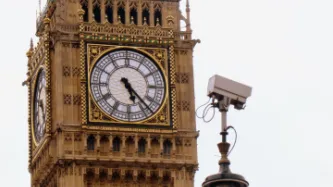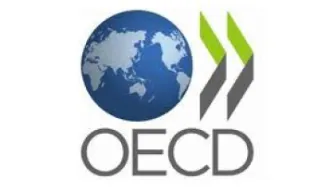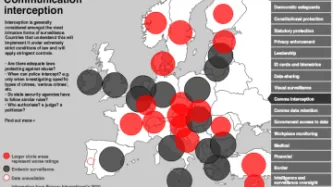Search
Content type: News & Analysis
There's a small storm brewing in Switzerland around the private surveillance industry, as recent revelations have detailed how the country is quietly becoming a centre for companies to export their spy technologies around the world.
After initial media reports last month detailed how companies like Gamma International, sellers of the notorious malware suite FinFisher, are seeking licenses to export their technologies from Switzerland, we wrote to over 70 Swiss lawmakers,…
Content type: News & Analysis
The Zimbabwean government extended its reach into the private lives of its citizens this week by promulgating a new law establishing a central database of information about all mobile telephone users in the country. The Statutory Instrument 142 of 2013 on Postal and Telecommunications (Subscriber Registration) Regulations 2013, gazetted last Friday, raises new challenges to the already embattled rights to privacy and free expression in Zimbabwe, increasing the potential that the…
Content type: Press release
Civil society organisations today called upon the members of the Human Rights Council to assess whether national surveillance laws and activities are in line with their international human rights obligations.
The Snowden revelations have confirmed that governments worldwide continue to expand their spying capabilities, at home and abroad. Widespread surveillance is being conducted in violation of individuals’ rights to privacy and free expression, and is seldom regulated by strong legal…
Content type: News & Analysis
For some time now, Gamma International has been criticised for exporting dangerous surveillance technologies from the UK to repressive regimes. Now, we are learning that the company is taking its show on the road, as recent reports have said that Gamma are now attempting to export its products, including the spyware FinFisher, out of Switzerland.
With sales premises registered at a site just outside the Swiss capital Bern, Gamma has now applied to the Swiss Secretariat for…
Content type: News & Analysis
This week in London, the world's largest arms fair DSEI rolled into town, bringing together some of the world’s most sophisticated killing and torture equipment with some of the world’s worst human rights abusers. On sale this year was also some of the UK’s premier lawful interception and surveillance technology.
Considering the forum in which these technologies are being sold, and the caliber of customers looking to buy it, you would think that the sale of such…
Content type: News & Analysis
It was only a year ago when the UK Home Office repeatedly made statements about how their capability to collect intelligence was degrading, and how new laws such as the Communications Data Bill were necessary to protect citizens.
In hindsight, given the revelations about the UK domestic mass surveillance programs, these once desperate cries for more crime- and terrorism-fighting tools now look like nothing more than attempts to illegitimately spy more on all citizens. Quotes from those debates…
Content type: News & Analysis
Through our Big Brother Incorporated project, Privacy International over the past two years has been campaigning against the export of surveillance technologies by Western companies to repressive regimes. One of the seminal moments of this campaign was in 2011, when we partnered with Wikileaks to release the SpyFiles, which catalogued hundreds of brochures, presentations, marketing videos, and technical specifications exposing the inner workings of the international trade in…
Content type: News & Analysis
For some time now there has been a need to update understandings of existing human rights law to reflect modern surveillance technologies and techniques. Nothing could demonstrate the urgency of this situation more than the recent revelations confirming the mass surveillance of innocent individuals around the world.
To move toward that goal, we’re pleased to announce today the formal launch of the International Principles on the Application of Human Rights to…
Content type: News & Analysis
Following reports that the Mexican prosecution authority appears to be not only using FinFisher, but also to be involved in a corruption scandal surrounding the purchase of this intrusive surveillance technology, the Mexican Permanent Commission (composed of members of the Mexican Senate and Congress) has urged Mexico's Federal Institute for Access to Public Information and Data Protection (IFAI) to investigate the use of spyware in Mexico.
The corruption scandal, which entails the…
Content type: News & Analysis
All across the U.S. on 4 July, thousands of Americans gathered at Restore the Fourth rallies, in support of restoring the Fourth Amendment of the U.S. Constitution and to protest the recently-disclosed information regarding NSA spying on American citizens. Demonstrations took place in over 100 cities, calling on the U.S. government to respect the privacy rights of citizens in America and individuals around the world.
With all this talk of constitutional …
Content type: News & Analysis
In the wake of recent revelations about the NSA’s extensive surveillance powers over foreigners and American citizens, an ever-fuller picture of mass surveillance is being drawn in the US, the UK, and across the Western world. But what about clandestine surveillance practices in African states? How do they approximate or differ from those we’ve heard so much about in the last few weeks? A recent case from West Africa can help us begin to answer these questions.
In March,…
Content type: News & Analysis
The government of Pakistan has repeatedly shown it is relentless when it comes to deploying measures to censor and spy on its own citizens. Today, a report released by Citizen Lab reveals another repressive tool being used to control and prevent information being accessed on the internet -- this time with help from the Canadian web-filtering company, Netsweeper.
According to the report "O Pakistan, We Stand on Guard for Thee: An Analysis of Canada-based Netsweeper’s Role in Pakistan’s…
Content type: News & Analysis
Below is an excerpt of an article that recently appeared in Melbourne, Australia's The Age, written by Carly Nyst, Head of International Advocacy at Privacy International:
"Mass surveillance of a country's citizens by its government can no longer be said to be the preserve of authoritarian and dictatorial states.
The publication last week by The Guardian of classified National Security Agency documents has exposed the extent of surveillance by the US government, throwing into question…
Content type: Press release
In the wake of revelations that the UK Government is accessing wide-ranging intelligence information from the US and is conducting mass surveillance on citizens across the UK, Privacy International today commenced legal action against the Government, charging that the expansive spying regime is seemingly operated outside of the rule of law, lacks any accountability, and is neither necessary nor proportionate.
The claim, filed in the Investigatory Powers Tribunal (IPT), challenges the UK…
Content type: News & Analysis
In a landmark report, the United Nations today has broken its long-held silence about the threat that State surveillance poses to the enjoyment of the right to privacy.
The report is clear: State surveillance of communications is ubiquitous, and such surveillance severely undermines citizens’ ability to enjoy a private life, freely express themselves and enjoy their other fundamental human rights. Presented today at the UN Human Rights Council session in Geneva, the report marks…
Content type: News & Analysis
Out of concern for the potential international ramifications of the Communications Data Bill, fifteen of Privacy International's partner activists and organisations have signed a joint letter urging the UK to consider the detrimental impact this law will have around the world.
The letter reads:
Dear Editor,
The United Kingdom’s proposed Communications Data Bill is not only sinister in its intention to enable the UK government to monitor and control the internet, but it is ill-…
Content type: Advocacy
This stakeholder report is a joint submission by Privacy International (PI) and the Law and Technology Centre of the University of Hong Kong (HKU). PI is a human rights organisation that works to advance the right to privacy and fight surveillance around the world. PI has been working with HKU to conduct research and policy engagement on privacy and data protection issues in China and Hong Kong since 2009. Together, PI and HKU wish to bring concerns about the protection and promotion of the…
Content type: Advocacy
This stakeholder report is submitted jointly by Privacy International (PI), a human rights organisation that works to advance and promote the right to privacy and fight surveillance around the world. PI wishes to bring concerns about the protection and promotion of the right to privacy in Mexico before the Human Rights Council for consideration in Mexico’s upcoming review.
Content type: Advocacy
This stakeholder is a submission by Privacy International (PI) and Jonction Senegal. PI is a human rights organisation that works to advance and promote the right to privacy and fight surveillance around the world. Jonction Senegal is a human rights organisation based in Dakar, which aims to promote sustainable and equitable development and human rights both in Africa in general and in Senegal in particular. Together PI and Jonction Senegal wish to bring concerns about the protection and…
Content type: News & Analysis
The social news website MiroirSocial.com confirmed yesterday that the prominent French technology firm Bull SA has sold its controversial mass surveillance "Eagle" system to Stéphane Salies, one of its chief designers and an ex-director of Bull. The surveillance software was previously manufactured and supplied by Bull’s subsidiary, Amesys, a company that is currently the subject of a judicial enquiry in Paris following a legal complaint filed by two human rights organisations, the…
Content type: News & Analysis
Court Of Appeal Tells UK Government That Criminal Records Bureau Checks System Breaches Human Rights
Yesterday the Court of Appeal delivered its judgment in the case of R (on the application of T) v Chief Constable of Greater Manchester & Others concerning the operation of the criminal records check system. The court was considering three cases that hinged on the same question: whether or not the blanket requirement on those applying for jobs involving contact with children and vulnerable adults (approximately four million people each year) to disclose all past convictions,…
Content type: News & Analysis
It was only last year that women in Saudi Arabia finally gained the right to vote. However, it seems a sad case of ‘one step forward, two steps back’, as this year it was discovered that all Saudi women are being electronically tracked by their male ‘guardians’, who are automatically sent text messages when their female ‘dependants’ attempt to cross the border. For women seeking to escape abusive relationships, or simply the severe generalised oppression of women that operates…
Content type: News & Analysis
A full analysis of the UK Information Commissioner's "Anonymisation code of practice: managing data protection risk" will take time and working knowledge of how the code is used in practice.
At the launch, the ICO signalled that while they believed the code was now up to scratch, they were open to additions and clarifications given that it is the first document of its kind in the world. We applaud them for this; the code is likely to be copied internationally, so it is particularly…
Content type: Report
Privacy has truly become an issue of global resonance. A quick glance at policy agendas in countries around the world shows that privacy and surveillance issues are increasingly important. The challenge, however, is improving the ability of governments and policy stakeholders to engage in a policy debate that is informed about the dangers of surveillance and the importance of protecting privacy. This is the primary objective of our Privacy in the Developing World programme.
In this report, we…
Content type: News & Analysis
Twelve years after the Regulation of Investigatory Powers Act (RIPA) was passed by the UK Parliament, permitting the interception of communications without a judicial warrant and allowing the police to self-authorise access to communications metadata, some parts of this dangerous law are finally being properly scrutinised. This isn't an intentional review, but rather a by-product of a joint parliamentary committee's interrogation of the draft Communications Data Bill, the Home Office's…
Content type: News & Analysis
Today we launch the public consultation process for the International Principles on Communications Surveillance and Human Rights. From now until January 3rd, we are inviting comments and suggestions on the draft principles.
The rationale behind these principles is to provide civil society, industry and government with a framework against which to evaluate whether current or proposed surveillance laws and practices are consistent with human rights. Now more than ever, we need greater…
Content type: News & Analysis
There have been two rounds of meetings in 2012 of the OECD Committee for Information, Computer and Communications Policy (ICCP) and some of its working parties – in May and October 2012, with further meeting of two working parties in December. A ‘foresight forum’ on the ‘big data’ theme was held on 22 October. Civil society interest in the ICCP work programme is formalised through the Civil Society Information Society Advisory Council (CSISAC).
The Working Party on Information Security…
Content type: News & Analysis
One of the first things that strikes you about the chaotic East African metropolises of Kenya, Uganda and Zimbabwe is the blanket of adverts for mobile phone companies that covers them, from the walls of the immigration hall at Harare airport, to the rickety shacks that line the dusty streets of Kampala. Where official signage is unavailable, DIY versions are painted onto the roofs and walls of houses and small businesses. Stores selling mobile phones are rarely more than a few short steps away…
Content type: News & Analysis
Privacy International is proud to announce our new project, Eyes Wide Open, which aims to pry open the Five Eyes arrangement and bring it under the rule of law. Read our Special Report "Eyes Wide Open" and learn more about the project below.
For almost 70 years, a secret post-war alliance of five English-speaking countries has been building a global surveillance infrastructure to “master the internet” and spy on the worlds communications. This arrangement binds together the US, UK, Canada,…
Content type: News & Analysis
Communications surveillance is one of the most significant threats to personal privacy posed by the state. This is why many statements of fundamental rights across the world give special regard to the privacy of communications. For example, the Universal Declaration of Human Rights states in Article 12:
No one should be subjected to arbitrary interference with his privacy, family, home or correspondence, nor to attacks on his honour or reputation. Everyone has the right to the protection of…












